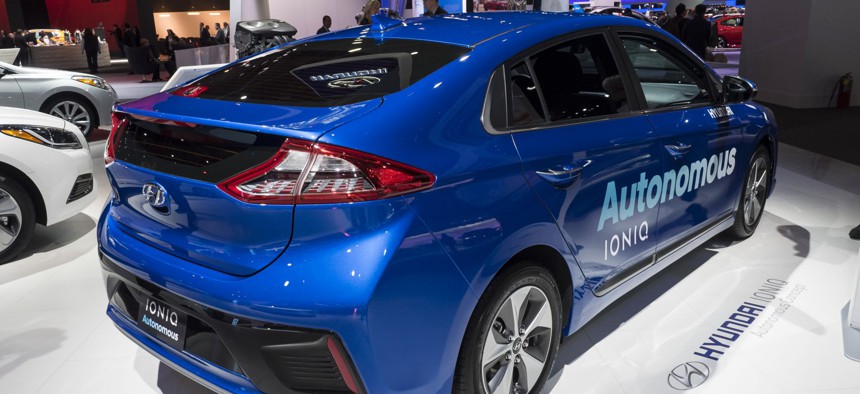Mayors Hear From Bill Ford on Autonomous Vehicles and Other Emerging Technologies

Hyundai IONIQ autonomous car on display during the North American International Auto Show at the Cobo Center in downtown Detroit. Shutterstock
“We don’t have all the answers,” the Ford Motor Co. executive chairman said. “We often don’t even know what the questions are.”
WASHINGTON — The future demand for parking garages in cities and the ethics of self-driving vehicles were among the topics Ford Motor Co. Executive Chairman Bill Ford discussed before a group of mayors from around the country on Wednesday.
Ford made his remarks at the U.S. Conference of Mayors annual winter meeting in the nation’s capital. He appeared on stage with Oklahoma City Mayor Mick Cornett, the current president of the organization. Much of the conversation focused on how emerging transportation technology, and particularly autonomous vehicles, could affect cities in the coming years.
Parking Structures
Cornett asked Ford for his views on whether it would be wise for cities to expand parking facilities in downtown areas. Structures like parking garages can cost millions of dollars to build.
There are arguments that autonomous vehicles could drastically cut the amount of parking needed in cities.
Autonomous cars that could park more precisely than human drivers, and without occupants inside, would be able to squeeze into especially tight spaces. At the same time, models for car ownership could change with the advent of autonomous vehicles, perhaps with people requesting rides from shared fleets of self-driving cars.
“Short term you probably still have to be thinking about it,” Ford said of adding new space where cars can be parked. “Long term there should be much less need for parking structures.”
Autonomous Vehicle Ethics
Like human drivers, the computer technology in autonomous vehicles will need to make quick choices as they travel on roadways—sometimes with grave implications.
“These vehicles will be able to process information much faster than you and I,” Ford said. “And therefore it will make decisions on who it hits.”
He added: “Does it protect the occupant? Does it protect 10 pedestrians?”
For now, where guidelines will be set for how autonomous vehicles make these sorts of decisions is unclear. Ford said that cities and universities could act as conveners, sparking new conversations about these kinds of autonomous vehicle ethics issues.
“This is a national discussion that we have to have,” he said. “These are the kind of things that are going to have to be considered before we have widespread adoption.”
Powering Vehicles
Electric power is now at the forefront of discussions about what will fuel vehicles in the coming years. This has implications for states and localities as they consider the infrastructure they provide, including vehicle charging stations and even electric grids.
Ford said that three or four years ago, biofuels were seen as a promising top alternative to gasoline. Hydrogen is another option that’s received attention. “The fuel of the future kind of keeps changing,” he said. But he added: “I think you’ll see a big shift towards electrification.”
Cornett pointed out that bets on emerging technology can be a tough proposition for risk averse governments. A fear is that an investment won’t pay off if technology becomes outdated too fast.
Similarly, Ford noted that it can be hard for companies to pivot away from technology once they’ve invested in staff and infrastructure to support it.
“We don’t have all the answers,” he said. “We often don’t even know what the questions are . . . But you do have to place bets at a certain point.”
Bill Lucia is a Senior Reporter at Government Executive’s Route Fifty and is based in Washington, D.C.
NEXT STORY: Knight Cities Challenge to Choose From 144 Finalists Looking to Improve Urban Livability






